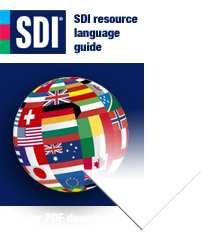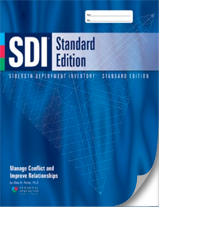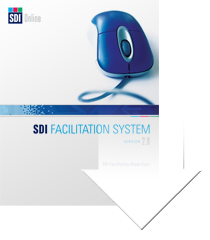SDI Inventories and Products
Our core resources offer powerful insights that build self and other awareness in the following areas:
SELF ASSESSMENTS:
Who am I? Who are you?
Strength Deployment Inventory®
Strength Deployment Inventory (SDI) is a powerful, self-discovery inventory for enhancing your ability to transform your workplace, your relationships and your life. SDI assists people to appreciate diversity, communicate more effectively and handle conflict more productively. Unlike other personality assessments, the SDI goes beyond behaviour to identify the motivation behind behaviour — answering “why” individuals act the way they do. It becomes easier to accept another person’s actions when you understand their motives, intention and then their behaviour. Plus, by revealing response to conflict, the SDI is actually two valuable assessments in one.
Various formats are available to fit any training situation: SDI Standard Edition, SDI Premier Edition,SDI Easy-Read Edition, and Online SDI Standard Edition. Also available is the Interpretive Guide for debriefing participants who complete the Online SDI.
View the SamplePortrait of Personal Strengths™
The Portrait of Personal Strengths is a practical learning resource that compliments and extends SDI insights. It is completed by sorting and prioritising 28 strengths/behaviour traits that you use when relating to others.
Used in conjunction with SDI, it quickly helps people to understand the strengths they most and least frequently use when relating with others, giving essential insights into development opportunities for individuals and other areas such as team norms, culture and strength gaps. It’s “sort and place” format makes it an enjoyable break from traditional assessment tool formats.
View the SamplePortrait of Overdone Strengths™
‘Strengths when overdone or missaplied, can be perceived as weaknesses’.
With the Portrait of Overdone Strengths, you consider which strengths you may be inclined to overdo on occasions. The insights gained from this Portrait can reveal potential sources of interpersonal conflict. Participants who use this portrait report that they make more informed behaviour choices by recognising when they are about to overdo a strength. When the costs of overdone strengths become clear, participants feel more empowered to borrow other behaviours and be more effective. It’s useful for any situation where people relate to each other, such as the workplace or with family.
FEEDBACK ASSESSMENTS:
How do you see me? How do I see you?
SDI Feedback Edition®
The Feedback Edition of SDI produces feedback that describes how others see you when things are going well and when things are not going so well.The results reflect the perception of the feedback provider, such as colleagues or partners. Comparing the perceptions of others to one’s perceptions of one’s self provides invaluable insight into the possible causes of interpersonal harmony or conflict.
Feedback Portrait of Personal Strengths™
The Feedback Portrait of Personal Strengths highlights the similarities and differences that arise as people use their strengths in relationships. This portrait provides a vehicle to communicate appreciation of another person’s strengths. It is a valuable conversation starter that builds relationship connections. Learning occurs for both the feedback provider and the feedback recipient. Included is an easy-to-use gap analysis where specific areas for attention are easily identified. Available in paper and online.
Feedback Portrait of Overdone Strengths™
This portrait offers a unique, non-confrontational way of giving feedback by addressing the potential cause of the conflict — not the conflict itself. The Feedback Portrait of Overdone Strengths reveals assumptions that people make about others and helps to resolve misunderstandings. It effectively explores differences in perceptions about how people may overdo or misapply their strengths, thereby causing unwarranted conflict in relationships. Specific areas are highlighted through an easy-to-use gap analysis.
EXPECTATIONS ASSESSMENTS:
What is expected in my role?
What is expected in your role?
SDI Expectations Edition®
Utilise SDI Expectations Edition to identify, clarify and manage the expectations within any role or relationship. When people know what’s expected, this can decrease conflict or lack of engagement. This inventory is especially useful in situations where expectations differ, are unclear or have not been communicated to everyone involved. Comparing several people’s expectations about the same role or relationship can help clarify and build consensus about expectations. SDI Expectations Edition provides an objective forum to get everyone’s expectations out in the open so that differences can be discussed in a non-threatening and non-judgemental way.
View the SampleExpectations Portrait of Personal Strengths™
With the Expectations Portrait of Personal Strengths, stakeholders related to a role are able to prioritize 28 different expected strengths or behaviours in order to identify discrepancies in expectations. This flexible tool can be used as a self-assessment for a person’s own role, as a feedback instrument, or even to clarify expectations of a vacant role. Participants gain insight into sources of satisfaction and/or misunderstanding with the role and learn how borrowing behaviour can enhance effectiveness.






